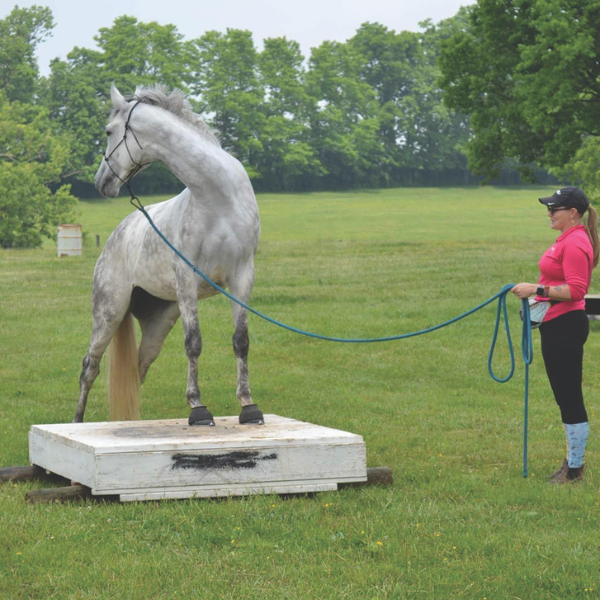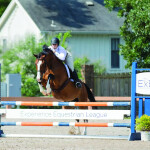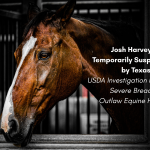By Grace Netter. Megan and Hub Corbett tackled this year’s 2023 Retired Racehorse Project Thoroughbred Makeover not only as a team, but also as spouses. Based at their own Hillside Haven Farm in Upton, Kentucky, they share a passion for off-the-track Thoroughbreds and their transition into second careers.
There was no better place to exhibit this than the RRP Thoroughbred Makeover, a yearly competition that is open to trainers with Jockey Club-registered retired racehorses that have not had more than 15 retraining rides prior to the application period. Boasting divisions for professionals, juniors, and teams, in 10 different disciplines, the competition’s goal is to highlight the versatility of off-the-track horses. This English and Western duo decided to pursue the Competitive Trail competition for their first time competing in the Thoroughbred Makeover, which was held October 11-14, at the Kentucky Horse Park, in Lexington, Kentucky. Together they share more about their journey with the Q&A below.
Q: How did you two meet, and what are your equestrian backgrounds?
Megan: We met training horses while at a riding stable where I was teaching lessons. I am a Three-Day Event rider who buys and sells thoroughbreds off the track, and I also compete Thoroughbreds myself, as well. We both do this to take care of our personal farm, so that we can continue doing what we love there.
Hub: I’m a lifelong horseman who is a horse-starter turned professional truck driver, currently driving a fuel truck for Thornton.
Q: Can you tell us a bit more about your RRP Thoroughbred? What is her name, and how did you acquire her?
Megan: We decided to keep her race name, which was Mambacita, or “Mamba.” She was named after the late Kobe Bryant’s daughter, Gianna. I had bought her through a friend of a friend who knew that she was coming off the track in Indiana after being trained by Tim Glyshaw. I actually sold her half-sister, so I was familiar with the bloodline. I then purchased her through the owner, Harlan Malter. She has baby pictures, a detailed history, and everything, which is a testament to the owner’s and trainer’s dedication to getting their horses into good homes post-career.
Q: Why did you choose the Competitive Trail discipline, and how was the training process for the Retired Racehorse Project?
Hub: Mamba wouldn’t usually be the best candidate for Competitive Trail because she’s a firecracker. However, this was perfect to not put too much pressure on her with her future career in Eventing. Going straight into the Eventing or Show Jumping discipline would be too much of an ask for her and would push her too far too soon. Knowing this, that is why we chose the direction we did. I believe that it is beneficial for all horses to know to put their feet where you want them to go, as you have to ask them specific feet for specific movements. This will help make an event horse that is more quiet and easy to get along with. We wanted to enter her in something we thought we’d get her to do and would be beneficial for her and help in the long run.
Megan: We actually thought about doing the Ranch Work discipline, but she was scared of cows. She was out for two months from being lame from pulling a glute muscle, so she had to be worked slowly. Due to Hub’s work schedule, I did most of the training, and we chose the team competition because of this.
Q: What was your experience at the competition itself?
Megan: What’s fun about the Thoroughbred Makeover is that there are so many disciplines, and it was just so electric. Thoroughbreds’ work ethics are second to none. They do seem wild, but you give them a job and they’re down to business. Once they know their job, they’ll do it. Even with that, it was a challenge to see what we could do in 10 months. I believe that, “to compete was to win” in this competition. There were people from all over the country here, and there were a lot of people who had a lot of money invested in this particular show. That’s what I love about the Retired Racehorse Project: the incentive and prize money to better the breed.
Hub: There were many people doing disciplines that they actually didn’t know how to do before the competition. Not in a negative way, but there were a lot of competitors that were there to have fun and learn new things. I will say that since we live so close, it was nice that we could just pack up and go home each day, instead of staying the whole weekend.
Q: So how did you score overall?
Megan: We ended up as the 3rd placed team and 29th overall. They split it up so that Hub and I each rode half of the obstacles. However, we were only scored through obstacles 1-7 and did not finish 8-10 as the timer ran out before Hub could get Mamba into the water. She was at 66/70 points, so if she had gone into the water we would have scored better, but that’s just where Mamba was at that point.
Hub: I knew that you were allowed to go around an obstacle if your horse didn’t like it, but I was thinking more like a trainer than a competitor, so I wanted her to address the water instead of worrying about the competition score.
Q: What did you think about training and competing a horse as a team?
Megan: I enjoyed being on a team! Since he works in trucking now, it was cool to see Hub have all of his skills and give him a reason to go work with the horses instead of just doing farm work.
Hub: It goes without saying that no two people train a horse exactly the same way, so it was interesting to have to train a horse as an item. The horse realizes this and it made her a bit more difficult to train consistently between two people. She is not a horse that I would say is game for competitive trail because she’s a live wire. During the competition, a judge noted that Mamba responded more to Megan because Megan was with her more and because she is a sensitive mare. I can see how this came up in the competition after having two people working with her. She would thrive as a one-rider horse, but we wouldn’t know this until we started working with her for this competition.
Q: What are your plans for the future with her?
Megan: Right now she’s not for sale, and I plan to eventually event her. There is definitely more competitive trail in the future too as that is just less stressful.
Q: Megan asks Hub: After working with Quarter Horses your entire life, how would you promote the Thoroughbred breed to those who haven’t ridden them, since the Retired Racehorse Project is about promoting the breed?
Hub: In general, if you’re trying to find a horse for yourself and find an off-the-track Thoroughbred that you get along with, don’t not choose it because it’s off the track. Each horse is an individual and can do all jobs. You have to just go off the individual horse and not the stereotypes of the breed. The good thing is that most Thoroughbreds will stand for the farrier already and know how to load onto a trailer already. The cost evens out if you’d go buy a different breed and then have to train it to work with the farrier or trailer.
Megan and Hub are excited to continue representing the Thoroughbred breed in second careers, and are grateful to the RRP Thoroughbred Makeover for giving riders the opportunity to show off the breed. For more information on the Retired Racehorse Project, please visit www.therrp.org.










